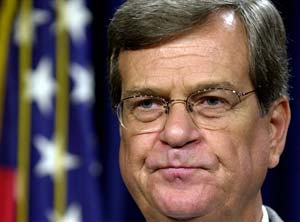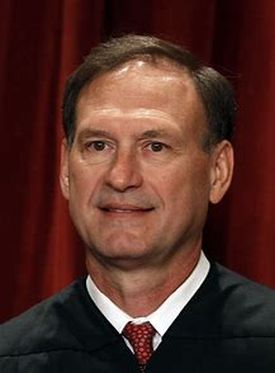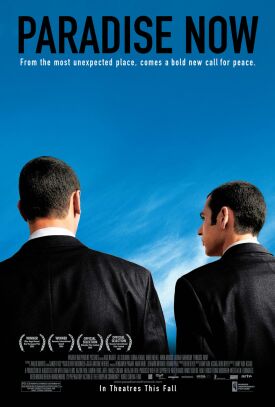Confidence Motion
From The New CriterionNot unusually, Time magazine’s story got the thing just exactly wrong: “Whitewashing the Past” read its cover line, superimposed on the photo of a worried-looking Trent Lott. What the editors appear to have meant was that Lott himself was attempting to “whitewash” the past — his own, his state’s and his party’s — either by his now notorious words of tribute to Strom Thurmond’s “Dixiecrat” presidential campaign of 1948, given at Senator Thurmond’s 100th birthday party (if Thurmond had been elected, he said, we wouldn’t have had “all these problems” that we have had since), or in his increasingly abject apologies for them afterwards. But this was just the reversed image of Lott’s own stupidity in pretending that any such thing was even remotely possible. You might as well talk of whitewashing the ocean.
Not, of course, that racism has ceased to exist. It is almost as impossible to imagine its doing so as it is to imagine any return to the respectability enjoyed by some kinds of racial prejudice in some parts of the country only a generation ago, which is what a “whitewash” would presumably entail. But if Lott affected to think such an eventuality less than preposterous out of misplaced sentimentality about a senatorial colleague, Time, like the rest of the media, affected to think so because of its vested interest in making a scandal. To this end the media pretended that such a whitewash was not only possible but imminent, and that not only Lott but the Republican party as well were secretly nostalgic for segregation. As Time put it, “Despite making four apologies by the end of the week. . . the incoming Senate leader had wounded not only himself but also his party’s decade-long campaign to shed its reputation for thinly veiled race baiting.”
The “reputation” to which the authors, Dan Goodgame and Karen Tumulty, referred may be news to many readers who do not keep well up on the orthodoxies of the left — according to which appeals to the electorate based on principled doubts about the wisdom of legally-enforced affirmative action, for example, or doubts about the wisdom of furloughing convicted murderers from prison, are automatically assumed to amount to “thinly veiled race baiting.” But Time’s careless betrayal of its parti pris was only a less-subtle manifestation of assumptions that proved to be all but universal in the media commentary on Lott’s blunder. Thus that admirable stylist, Adam Clymer, offered in the New York Times a more carefully-worded version of the same view when he wrote that “President Bush’s repudiation of Senator Trent Lott today, as an apostate to the ‘founding ideals’ of the Republican Party, underlined the juggling act the party has maintained on race for nearly four decades.”
Come again? The president could hardly have been more unequivocal when he said to a predominantly black audience in Philadelphia that
recent comments by Senator Lott do not reflect the spirit of our country. . .He has apologized, and rightly so. Every day our nation was segregated was a day that America was unfaithful to our founding ideals. And the founding ideals of our nation and, in fact, the founding ideals of the political party I represent was [sic], and remains today, the equal dignity and equal rights of every American.
Surely, if words mean anything this meant that he was resolutely and admirably refusing to “juggle”? But once you have established that what people say is merely a plausible cover for what they really mean, the adumbration of what they really mean becomes fraught with imaginative possibilities, besides being for the media a much more essential public service than merely relaying to the public what they think they mean.
For what lay behind the larger media campaign of which Time and the New York Times were both a part was the mentality of the gaffe-patrol. Much was made of Michael Kinsley’s dictum that a gaffe — in this case a “supergaffe” — “is when a politician says what he really thinks.” But this is not quite accurate. Kinsley himself identifies for us, also in Time, his point of access to what people “really” think by saying that Lott’s remarks “bubbled up from his id and escaped through his lips when his guard was down, thereby exposing an important and deeply distressing moral flaw in Lott himself.” Kinsley does not think it worth his trouble to justify or apologize for his foray into amateur psychoanalysis; it is merely taken for granted — and not only by Kinsley, one suspects, but by many less learned and adept Freudians in newsrooms across the nation.
Philip Kennicott, for instance, in one of those urbanely ruminative commentaries on the news that makes the Washington Post’s “Style” section such a congenial home for critics and philosophers, explained why Lott-like grovelling is “such compelling spectacle” by noting that “because everyone knows that apologies are almost always wrung out reluctantly — or qualified with excuses or patently insincere — the public, for a brief moment, has the upper hand. The public makes the man dance, not for his soul but his future.” Then, after a quick résumé of the views of William Empson in Seven Types of Ambiguity, Kennicott went on to conclude that “Lott’s efforts to explain and excuse the remarks implicitly acknowledge the thing that makes public gaffes so disturbing: the belief (see Freud) that we tell more of the truth when our tongue slips than when we say exactly what we intend to say.”
“The truth,” that is, like “reality,” like “the public,” finds a ready spokesman in the journalist, who has grown accustomed to taking his own familiarity with such concepts for granted. In fact, however, he is interested in only certain kinds of truths. Thus if a politician “really” thinks that two and two make four — or that, say, the founding ideals of the nation include equal dignity and equal rights for every American — and he should happen to allude to these thoughts in conversation, he commits no gaffe. Neither does he, coincidentally, offer any story to the hungry journalist with a news-hole to fill. But gaffe and story alike do result if he says something disreputable which the media can plausibly identify as a window into some notional and psychological “reality,” hidden by outward and more respectable appearances probably even from the speaker himself, which it is their raison d’Ltre to open up to the public view.
This much is in the nature of the journalistic self-conceit and not dependent on the political complexion of the gaffe-maker whose psyche is being explored for the sake of the public’s enlightenment. But in Lott’s case the gaffe also served as an excuse for the exercise of characteristic media biases about the political philosophy of the Republican party. In fact, insofar as Lott could be made to stand for Republican “race-baiting,” he himself could be let off the hook — hence Time’s handsome concession: “Most of those who know him best, foes as well as friends, say they don’t consider Lott a racist in the sense of someone who hates blacks and plots to hold them down.” No? Then in what sense is he a racist? While not actually using the term in positive identification, Time continues, “Rather, friends say, Lott has believed — at least until last week — that government has no business forcing one group of people to associate with another, nor should it compensate anyone for past injustices.”
Fully to appreciate the idiocy of this simultaneously sly and mealy-mouthed slur, just consider the converse of its two terms. So are we to suppose that non-racists believe it is the business of governments to force people to associate with one another? So are we asked to believe that Lott doesn’t believe any victims of injustice should be compensated? As it so often does, the sloppiness of Time’s writing and editing betrays its liberal and Democratic biases. Likewise, in outlining Lott’s political ideas, Goodgame and Tumulty write: “He supported expanded outlays for the military, farm subsidies, rural public-works projects, Social Security and Medicare. The main federal activities he opposed were taxes, programs aimed at helping the poor and civil rights laws.”
Most Americans, needless to say, oppose programs aimed at helping the poor if they don’t really help the poor — if, in fact, they hurt the poor, which was the conservative Republican position on welfare policy before 1996. But in Time’s political theology, as in that of the old-fashioned “liberal” Democrats, anything “aimed at” such help is apparently tantamount to helping. Talk about a Freudian slip! Time also uses the term “civil rights” to describe policies that, nowadays, even most Democrats would repudiate. Lott’s “resistance to civil rights,” observe the authors, “was low-key but consistent. He supported a constitutional amendment in 1979 to prohibit school busing, but it failed.” There are no doubt, even today, those who believe that an American’s civil rights include, or ought to include, the right to be transported by bus to a school with a racial mix approved-of by a federal judge. But you wouldn’t be able to tell from Time that it is also possible to support civil rights without believing this.
Yet let us leave aside for the moment the question of the Republican party’s crypto-racism. Let us, indeed, stipulate that it exists. My point is that the media will always and necessarily exaggerate it because the foundational mythologies, especially of Watergate and Vietnam, on which they base their claims to moral authority require them to do so. Their very existence — at least their existence as the “objective” and “non-partisan” moral arbiters they pretend to be — depends on their ability to persuade the public that reality and appearance are at variance, and that they are uniquely placed to offer us the keys to reality. Thus, while it is easy to believe that Senator Lott, like other white Mississippians, might well be in two minds about the history of race relations in the South, it takes the media to tell us that the part of him inclined to be indulgent towards the past is more “real” than the part which later professed to find it “wrong” and “terrible.”
Of course, it is true that Lott wanted to be the Senate majority leader, and he eventually realized that this would not be possible unless he could persuade the media that his racially enlightened side was more “real” than his racially unreconstructed side. This was in itself a reason to believe that the opposite was the case. But such ontological calculations had in the end very little to do with anything in — please pardon the expression — the “real” world. The very fact that Lott felt constrained to apologize so incontinently was the measure of the extent to which the original offense was actually a trivial one, and without any bearing on actual political behavior, since it showed how inconceivable it was that anyone with anything like genuinely segregationist views could survive electorally in American politics.
This made it all but certain that, as many a wise media head pointed out at the time, the Democrats would have preferred him to remain as a convenient Aunt Sally for them, as Newt Gingrich used to be, during the next electoral cycle. Former President Clinton, who did such a brilliant job of demonizing Gingrich, led the way when he said that Republican criticism of Lott was “hypocritical” since what he said was only what their party does “on the back roads every day.” Huh? The Republicans practise segregation on the back roads every day? No. Clinton was pretty obviously alluding, with a characteristic mastery of the spin-master’s vocabulary, to another of the features of the Jim Crow South: lynching. Here was a type of ambiguity that never occurred to William Empson!
Thus ever to Republican race-baiting, the Democrats might say. But alas, Lott the lyncher was snatched away from political dismemberment in their spin-machine at the last moment — not that they won’t find some use for him even on the back benches. Clinton’s contemptible hinting, so reminiscent of his vice-president’s intimation in the last presidential campaign that George W. Bush approved of the racially motivated murder of James Byrd Jr. in Jasper, Texas, naturally obscured the real reason why Lott showed himself to be unfit to be the Republican leader. His appearance with Ed Gordon on BET was excruciatingly, toe-curlingly embarrassing, so much so that he appeared to have Richard Nixon’s or Al Gore’s sublime unconsciousness of the embarrassment he ought to have felt for saying such obviously phony things as that he was in favor of affirmative action because he had black people on his senatorial staff. “My actions,” he claimed, referring to these same benefactions, “do not reflect my voting record.”
Oh dear, oh dear! Could he really have been bragging that he was a hypocrite on race, cynically exploiting the racism of his fellow whites and not its black victims? The absurdity of the apology was even more grotesque than that of the original offense. About both we could say, as Robert Musil says of national claims to “redemption” under the old Hapsburg empire in The Man Without Qualities, “it was not so much the words that offended a healthy common sense as their absurd claim to being taken literally.” In asking to be forgiven Lott had all but made forgiveness impossible. Clearly, it was time for him to show his first bit of genuine shame and vacate a position of which he had become less an adornment than ever.
Still, a part of me hated to see him go if only because it was another melancholy step on the road towards the media’s dominance of our political system. America appears to be struggling toward a variation on the parliamentary system in which politicians are disciplined by the necessity to retain the confidence not of their peers but of the major daily newspapers and the television networks. And, so far from being troubled by this unofficial and undemocratic amendment to the Constitution, the media themselves cheerfully reported the deference of the politicians to their media masters as if it were the most natural thing in the world. Thus Dana Milbank and Jim VandeHei of the Washington Post reported early on that “Republican senators, including some who criticized Lott’s comments in private, said his job appears safe so far, although several said things could change dramatically if the controversy is not quelled soon.”
Did it occur to Messrs. Milbank and VandeHei sternly to ask their anonymous interlocutors: Do you have confidence in your leader or not? Did they think to say: Surely you cannot be so craven as to suggest — even if it were true — that you intend to wait and see whether we, and our colleagues of the media who are responsible for this “controversy,” have confidence in him before you decide whether or not you do? They did not. By now both the media and the politicians implicitly accept the right of the former to judge the latter, who are left feebly to hope for mercy when they stumble into gaffe-land. Thus, “if Lott can weather the storm a few more days,” those unnamed senators told Milbank and VandeHei, “they believe the controversy will blow over.”
At least Senator Hagel of Nebraska allowed his own name to appear in the New York Times attached to a similarly agnostic statement signifying his acquiescence in whatever verdict the media should ultimately render: “How serious it yet becomes, I don’t know.” Earlier, even the Democrats’ leader, Tom Daschle, was inclined to minimize the importance of Lott’s remarks until he “found himself under pressure among his colleagues to toughen his position” (according to the Post). This may well be true, but it was probable that the pressure he cared about came less from his colleagues than from the media, whose promotion of the “controversy” demanded some factitious outrage from him. As Martha Brant of Newsweek said on CNBC in reporting her editor’s insistence that “you need to find the next scooplet” dredged up from Lott’s past utterances, “Frankly, we’re now in the media going to give this thing steam. The Democrats may not even need to fan the flames of this.”
Nor, of course, did they. Their own race-baiting was kept largely out of it, apart from occasional Daschle-like statements of “concern.” Yet neither the media’s willingness to carry water for the Democrats nor their untroubled delight in appointing themselves arbiters of “truth” and “reality” for “the public” was as worrying as the unquestioning acceptance by our political class of the media’s new and quasi-constitutional function in deciding what words, or even what states of mind, unfit a man for holding public office. After the last Tory party conference in Britain, W.F. Deedes, the veteran reporter and former editor of the Daily Telegraph wrote:
“Tell me your secret worries,” I said softly to Tories at Bournemouth with a moment to spare. A surprising number mentioned the power of the news media. Powerful guns, they thought, were hammering people in politics and feeding public mistrust of them.
Labour has the same feeling, I suggested lightly, which is why it employs so many spin doctors. But, on reflection, I think there is substance in this feeling that journalists and broadcasters have grown more dominant. Leading news media figures today cut stronger figures in the public eye than many ministers and almost all in the shadow cabinet.
“What’s wrong with that?” the media pundits will say. “We are your guardians against perfidious politicians — and look how many of those we have had to expose in recent times.” That’s a smart answer, but incomplete.
With experience of politicians going back to the 1930s, I would say that today’s lot are not a whit less honest and trustworthy. But the news media are much sharper in exposing their frailties. A good thing, too, you may say. Not altogether, if it induces a cynical public to despise public figures as second- rate.
As some of my witnesses at Bournemouth pointed out, the news media are now seen by able young people as a more rewarding career than public life. Why? Because they sense that is where power now lies.
Years ago, when it was suggested to William F. Buckley Jr. that he should run for the Senate, he quoted approvingly John Kenneth Galbraith’s observation that the Senate was “a good forum — if you have no other.” Now that spin rules all and the media decide what Senators shall be allowed to say, it’s not even that.
Discover more from James Bowman
Subscribe to get the latest posts to your email.






